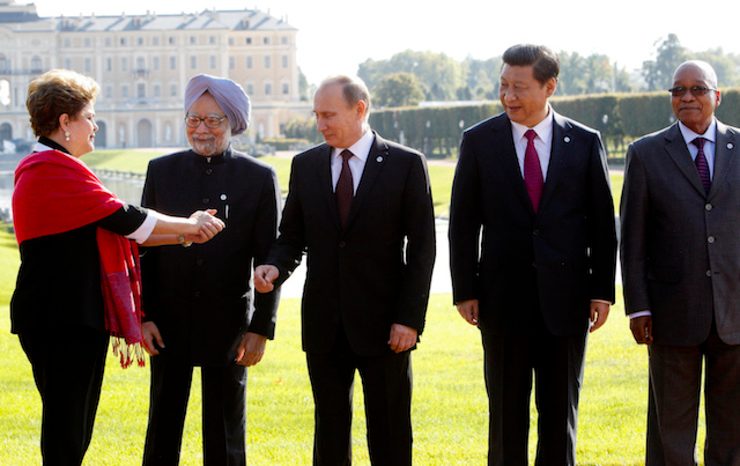SUMMARY
This is AI generated summarization, which may have errors. For context, always refer to the full article.

FORTALEZA, Brazil – The summit of the BRICS group of emerging economies this week defies the Western push to isolate Russia, the latest sign of the increasingly multipolar world order the bloc demands.
When the leaders of the group’s member countries – Brazil, Russia, India, China and South Africa – get together Tuesday and Wednesday (July 15-16) in Brazil, it will mark the first time Russian President Vladimir Putin has participated in an international summit since being kicked out of the G8 group of industrialized nations over the Ukraine crisis.
“The BRICS grouping has shown that the West can no longer co-opt emerging powers into falling into line, even about crucial geopolitical issues,” said Oliver Stuenkel, a professor of international relations at Brazil’s Getulio Vargas Foundation.
“They refused to participate in efforts to isolate Russia,” he told Agence France-Presse, saying that thanks to BRICS support, it would be impossible to expel Russia from the G20 club of developed and emerging countries.
The summit comes as relations between Russia and the West have hit a post-Cold War low over Moscow’s takeover of Crimea and support for rebels fighting to break away from Ukraine.
The meeting’s final declaration could address the Ukraine crisis, a Brazilian government official said in a briefing.
In March, the BRICS all abstained from a vote at the United Nations General Assembly on a resolution condemning Russia’s takeover of Crimea.
At the time, Vadim Lukov, the Russian foreign ministry’s coordinator for BRICS, said the Ukraine crisis had “contributed to a consolidation of the alliance.”
“It’s rewarding for Putin to see ahead of the BRICS summit that in the face of relative Western solidarity, there’s a clear difference (of position) among his partners,” said Bertrand Badie, a researcher at the CERI center for international studies in Paris.
He said the fact that even China, which is normally “very concerned about issues of territorial integrity,” had remained neutral on Crimea was a positive sign for Russia.
The tacit support indicates these countries’ important bilateral relationship with Russia. Within the BRICS group itself, there is “no pressure to adopt a common position,” said Badie.
The Ukraine crisis has also given the BRICS members an occasion to voice their opposition to the way Western powers dominate the international arena.
“The BRICS have been pretty clear in their opposition to US and EU sanctions against Russia,” said Mark Weisbrot, co-director of the Center for Economic and Policy Research in Washington.
“The BRICS countries can’t force Washington to change its foreign policy. All they can do is make Washington pay a political and economic price for it.”
‘Financial revenge’
The strategic centerpiece of the summit is the creation of a development bank and reserve fund, providing an alternative to Western-dominated institutions such as the World Bank and International Monetary Fund.
Badie said the move amounted to “a bit of financial revenge” by countries whose economies have enjoyed a recent boom after years of dominance by the United States and Europe.
“It would represent the initial construction of a ‘multipolar’ financial world to mirror the multipolar geopolitical universe that Putin desires,” said Charles Movit, Europe director for research and consulting firm IHS.
However, the bank would probably not lessen the pain of US and EU sanctions on Russia.
“What matters is whether the US or EU impose sectoral or technology-based sanctions,” said Edward Verona of strategic advisory firm McLarty Associates.
“These would deprive Russia of specific capabilities that other BRICS countries are unable to provide, such as oil and gas drilling technology.”
Russia’s need for Western technology is a sign that economic reality may still be an obstacle to the multipolar world it is pushing for, he said. – Rappler.com
Add a comment
How does this make you feel?
There are no comments yet. Add your comment to start the conversation.